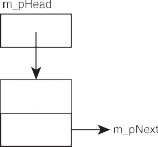< Previous | Contents | Next >
The Lobby class represents the lobby or line in which players wait. Here’s the class definition:
class Lobby
{
friend ostream& operator (ostream& os, const Lobby& aLobby);
public:
Lobby();
~Lobby();
void AddPlayer(); void RemovePlayer(); void Clear();
private:
Player* m_pHead;
};
The data member m_pHead is a pointer that points to a Player object, which represents the first person in line. m_pHead represents the head of the line.
Because each Player object has an m_pNext data member, you can link a bunch of Player objects in a linked list. Individual elements of linked lists are often
Introducing the Game Lobby Program 319
![]()

![]()

![]()

![]()
![]()
Figure 9.13
Each node holds a name and a pointer to the next player in the list. The first player in line is at the head.
called nodes. Figure 9.13 provides a visual representation of a game lobby—a series of player nodes linked with one player at the head of the line.
One way to think about the player nodes is as a group of train cars that carry cargo and are connected. In this case, the train cars carry a name as cargo and are linked through a pointer data member, m_pNext. The Lobby class allocates memory on the heap for each Player object in the list. The Lobby data member m_pHead provides access to the first Player object at the head of the list.
The constructor is very simple. It simply initializes the data member m_pHead to
0, making it a null pointer.
Lobby::Lobby(): m_pHead(0)
{}
The destructor simply calls Clear(), which removes all the Player objects from the list, freeing the allocated memory.
Lobby::~Lobby()
{
Clear();
}
AddPlayer() instantiates a Player object on the heap and adds it to the end of the list. RemovePlayer() removes the first Player object in the list, freeing the allocated memory.
I declare the function operator<<() a friend of Lobby so that I can send a Lobby
object to cout using the << operator.
320 Chapter 9 n Advanced Classes and Dynamic Memory: Game Lobby
Tra p
![]()
The Lobby class has a data member, m_pHead, which points to Player objects on the heap. Because of this, I included a destructor that frees all of the memory occupied by the Player objects on the heap instantiated by a Lobby object to avoid any memory leaks when a Lobby object is destroyed. However, I didn’t define a copy constructor or overload the assignment operator in the class. For the Game Lobby program, this isn’t necessary. But if I wanted a more robust Lobby class, I would have defined these member functions.
![]()